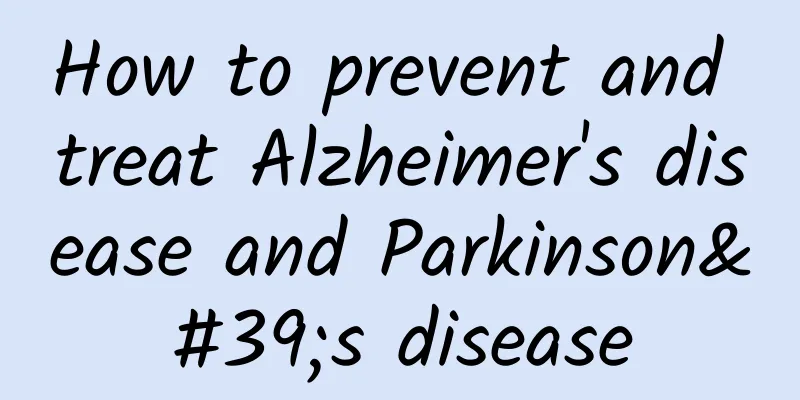How to prevent and treat Alzheimer's disease and Parkinson's disease

|
As the global population ages, the incidence of neurological diseases such as Alzheimer's disease and Parkinson's disease is increasing year by year. These diseases not only bring great pain to patients, but also bring heavy burdens to families and society. Therefore, how to prevent and treat Alzheimer's disease and Parkinson's disease has become the focus of public attention. This article will explain in detail the prevention and treatment measures for these two diseases. The picture comes from the Internet 1. Prevention and treatment of senile dementia 1. Definition: Alzheimer's disease, also known as Alzheimer's disease, is a chronic neurodegenerative disease. It primarily affects neurons in the brain, especially those associated with memory, thinking, and learning abilities. The disease causes the death and loss of these neurons, which affects the patient's cognitive function. Symptoms of Alzheimer's disease vary from person to person, but generally include memory loss, decreased thinking and judgment, language and communication disorders, disorientation with time and place, mood and behavior changes, and decreased ability to carry out daily life. These symptoms may gradually worsen, affecting the patient's daily life and ability to work. 2. Preventive measures: (1) Maintain a healthy lifestyle: Maintain a healthy diet, including eating more vegetables, fruits, and whole grains, and reducing the intake of saturated fat and sugar. Moderate exercise can promote blood circulation and metabolism, which helps maintain brain health. In addition, quitting smoking, limiting alcohol consumption, and reducing stress can also help reduce the risk of disease. (2) Maintain social activities: Participating in social activities can stimulate the brain and improve cognitive function. Staying connected with family, friends, and the community can reduce loneliness and promote neuronal connections in the brain. (3) Intellectual stimulation: Regular intellectual stimulation activities, such as reading, learning new skills, and participating in beneficial learning courses, can exercise the brain and improve cognitive function. This helps reduce the risk of Alzheimer's disease. (4) Control chronic diseases: Chronic diseases such as hypertension, diabetes, and high cholesterol are related to the occurrence of Alzheimer's disease. Regular physical examinations and controlling the development of chronic diseases can help prevent Alzheimer's disease. (5) Maintain a good mental state: Anxiety, depression, and other emotional problems may increase the risk of Alzheimer's disease. Therefore, maintaining a good mental state, such as seeking help through psychological counseling or therapy, can help reduce the risk of disease. (6) Drug therapy: Drug therapy can relieve symptoms and improve the patient's quality of life. For example, acetylcholinesterase inhibitors can improve memory and mental flexibility; NMDA receptor antagonists can reduce the rate of neuronal death. However, drug therapy cannot cure the disease, but can only relieve symptoms. (7) Non-drug treatment: Non-drug treatment includes cognitive training, physical therapy and occupational therapy. These treatments can help patients improve their ability to take care of themselves in daily life. (8) Psychological support: Alzheimer's patients may experience emotional problems, such as anxiety and depression. The support and understanding of family and friends are very important for the patient's mental health. Professional psychological counseling and treatment can help patients cope with emotional problems. (9) Caregiver support: Caregivers are important supporters of patients with Alzheimer's disease in their daily lives. Caregivers need to understand the symptoms and management methods of the disease in order to better care for the patient. At the same time, caregivers also need to pay attention to their own health and mental health in order to better cope with the stress of caring for the patient. The picture comes from the Internet 2. Prevention and treatment of Parkinson's disease 1. Definition: Parkinson's disease is a common neurodegenerative disease that mainly affects the dopaminergic neurons in the substantia nigra of the brain, leading to their degeneration and death. This disease usually occurs in middle-aged and elderly people, and is mainly manifested by symptoms such as resting tremor, bradykinesia, muscle rigidity, and postural balance disorders. 2. Preventive measures: (1) Drug therapy: The main treatment for Parkinson's disease is drug therapy. Drugs can help regulate the levels of neurotransmitters in the brain, thereby alleviating symptoms. Common drugs include dopamine agonists, anticholinergic drugs, and COMT inhibitors, but specific drug treatment needs to be carried out under the guidance of a doctor. (2) Physical therapy: Physical therapy includes exercise therapy, rehabilitation training and physical therapy, which can help improve posture, balance and mobility, relieve symptoms and improve quality of life. (3) Surgical treatment: For patients with severe symptoms that are difficult to control, surgical treatment may be an option. Common surgical methods include deep brain stimulation and ablation surgery, which stimulate or destroy specific brain areas to slow down the progression of the disease and improve symptoms. (4) Physical and psychological support: Parkinson's disease patients often need physical and psychological support. Family and friends should provide emotional support, help care and encourage patients to actively participate in social activities. At the same time, psychological counseling and support can help patients cope with the emotional and psychological stress caused by the disease. (5) Healthy lifestyle: Maintaining a healthy lifestyle helps manage Parkinson's disease. A balanced diet, moderate exercise, adequate sleep and reduced stress have a positive impact on patients' recovery and symptom control. (6) Close cooperation with doctors: Parkinson's disease patients should maintain close cooperation with doctors, undergo regular examinations and follow-up visits, and timely adjust and optimize treatment plans to achieve the best control of the disease. Alzheimer's disease and Parkinson's disease are common neurological diseases that seriously affect patients' daily life and work ability. The risk of disease can be reduced by taking effective preventive and treatment measures. For patients who are already ill, they need to receive medication and physical therapy under the guidance of a doctor. At the same time, they need to pay attention to their mental health and seek psychological support and help in a timely manner. References [1] Hu Rongrong, Li Feifei, Tao Jiaping, et al. Systematic review of the intervention effect of virtual reality technology on patients with dementia[J]. Health Research, 2023, 43(05): 519-524. [2] Zhu Yan. Carry out Alzheimer's disease prevention and treatment promotion actions to promote healthy aging[N]. China Family News, 2023-09-28(002). [3] Wu Yiting, Sheng Meiqing. Patients with Alzheimer's disease need good family care[J]. Family Medicine. Happy Health, 2023(08):24. [4] News from this journal. The National Health Commission will organize a nationwide campaign to promote the prevention and treatment of Alzheimer's disease[J]. Everyone's Health, 2023(19):7. [5] Chen Hui, Su Zhumin, Ma Xiaomeng, et al. Visual analysis of language and communication disorders in patients with dementia and cognitive dysfunction at home and abroad[J]. Medical Information, 2023, 36(13): 51-56. |
Recommend
What should women do with eczema?
Vulvar eczema is a very common disease that may o...
Seven tips to help women get rid of menstrual odor
Why is it easy for menstruation to produce odor? ...
How to exercise the pelvic floor muscles
When female friends are pregnant, they should pay...
When does morning sickness usually start?
When a woman finds out she is pregnant, but is st...
Can I exercise during early pregnancy?
Whether male or female, more and more people like...
How do girls train their chest muscles?
Many female friends are still struggling to find ...
What to do if stretch marks itch
Almost every pregnant mother will develop stretch...
Is it not good to walk more than 10,000 steps a day? How many steps should we walk?
Many people shake their phones when they sit down...
How to use soda water to wash your vagina
Once many women suffer from vaginitis, they will ...
Temperature drop in early pregnancy
Most women will experience some changes in their ...
Levofloxacin for gynecological inflammation
With the development of medical treatment, some c...
How to quickly reduce swelling of gingivitis and swelling in pregnant women
In fact, many pregnant women suffer from swollen ...
Vulvar leukoplakia pictures and symptoms image search
Vulvar leukoplakia is a chronic private part maln...
What are the symptoms of ovulation?
Ovulation is a normal physiological phenomenon fo...









